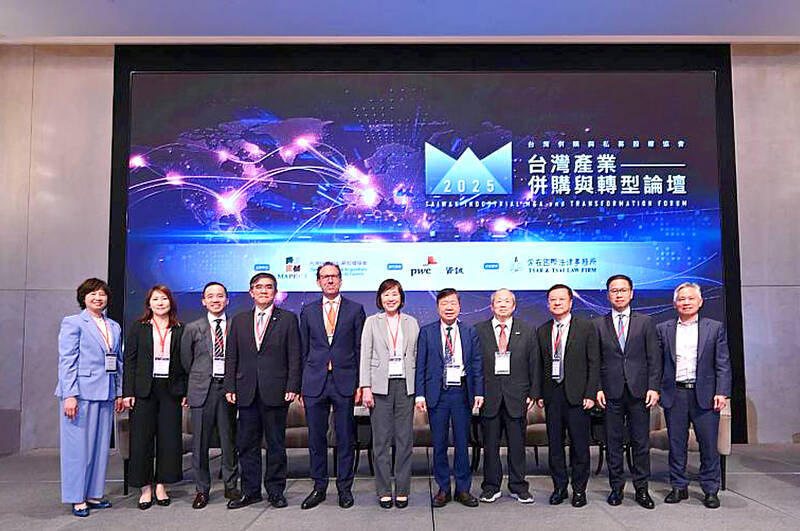Taiwanese companies should accelerate their footprint in global markets through mergers and acquisitions (M&As), taking advantage of a shifting geopolitical landscape that has depressed valuations and created a window for strategic expansion, an annual M&A report released yesterday said.
The report, issued jointly by PwC Taiwan (資誠) and the Taiwan Mergers and Acquisition and Private Equity Council (台灣併購與私募股權協會), said that buyers have the upper hand, as potential players turn largely conservative amid economic uncertainty linked to US tariffs.
Taiwanese firms must not view uncertainty as a deterrent, but an opportunity to secure future growth, Kelly Chou (周容羽), a managing director at PwC Taiwan told an M&A forum in Taipei.

Photo courtesy of PwC Taiwan
Cross-border dealmaking has become a core strategy for Taiwan’s corporations in the pursuit of critical technology, new markets and supply chain resilience, the paper said, citing a survey of more than 202 corporates, private equity funds and advisory firms.
That conviction is already reflected in capital flows. Taiwan’s M&A transactions last year surged 81 percent to US$16.22 billion, the second highest in history, although the number of deals declined slightly to 121, it said.
The number of outbound deals by Taiwanese firms reached a record 46 transactions, with a significant rise in deals of US$50 million or less, highlighting a preference for smaller, strategic acquisitions that enable controlled expansion with lower integration risks, the paper found.
The geographical footprint of Taiwanese investments is also undergoing a significant transformation, it said.
Once heavily concentrated in China and surrounding Asian markets, Taiwanese businesses are now diversifying aggressively, it said.
Last year, 55.5 percent of listed Taiwanese companies established operations across key regions such as the US, Canada, Europe, Japan, Southeast Asia, South Asia, Australia and New Zealand.
Only less than 20 percent remain focused on the Chinese market — suggesting how the US-China trade disputes and the COVID-19 pandemic have reshaped corporate strategy, it said.
In addition, Europe has emerged as an attractive destination. Pressured by the Russia-Ukraine conflict, rising interest rates and tightening environmental regulations, many European conglomerates are divesting non-core assets in an effort to streamline operations, it said.
Taiwanese firms, which are well-capitalized and increasingly ambitious, are stepping in to fill the void — bringing not only capital, but also strategic alignment, particularly in sectors such as semiconductors, medical technology and consumer electronics, it said.
Despite the momentum, challenges remain. Post-merger integration, especially in cross-border settings, continues to test management capabilities, it said.
The shortage of international managerial talent and the complexities of aligning corporate cultures also have proven difficult for many Taiwanese firms to overcome, it said.
Furthermore, inbound M&A has softened. Foreign interest in acquiring Taiwanese companies declined in both the number and value of deals last year, suggesting that international investors remain wary of the region’s geopolitical sensitivities, it said.

With an approval rating of just two percent, Peruvian President Dina Boluarte might be the world’s most unpopular leader, according to pollsters. Protests greeted her rise to power 29 months ago, and have marked her entire term — joined by assorted scandals, investigations, controversies and a surge in gang violence. The 63-year-old is the target of a dozen probes, including for her alleged failure to declare gifts of luxury jewels and watches, a scandal inevitably dubbed “Rolexgate.” She is also under the microscope for a two-week undeclared absence for nose surgery — which she insists was medical, not cosmetic — and is

CAUTIOUS RECOVERY: While the manufacturing sector returned to growth amid the US-China trade truce, firms remain wary as uncertainty clouds the outlook, the CIER said The local manufacturing sector returned to expansion last month, as the official purchasing managers’ index (PMI) rose 2.1 points to 51.0, driven by a temporary easing in US-China trade tensions, the Chung-Hua Institution for Economic Research (CIER, 中華經濟研究院) said yesterday. The PMI gauges the health of the manufacturing industry, with readings above 50 indicating expansion and those below 50 signaling contraction. “Firms are not as pessimistic as they were in April, but they remain far from optimistic,” CIER president Lien Hsien-ming (連賢明) said at a news conference. The full impact of US tariff decisions is unlikely to become clear until later this month

GROWING CONCERN: Some senior Trump administration officials opposed the UAE expansion over fears that another TSMC project could jeopardize its US investment Taiwan Semiconductor Manufacturing Co (TSMC, 台積電) is evaluating building an advanced production facility in the United Arab Emirates (UAE) and has discussed the possibility with officials in US President Donald Trump’s administration, people familiar with the matter said, in a potentially major bet on the Middle East that would only come to fruition with Washington’s approval. The company has had multiple meetings in the past few months with US Special Envoy to the Middle East Steve Witkoff and officials from MGX, an influential investment vehicle overseen by the UAE president’s brother, the people said. The conversations are a continuation of talks that

Nintendo Co hopes to match the runaway success of the Switch when its leveled-up new console hits shelves on Thursday, with strong early sales expected despite the gadget’s high price. Featuring a bigger screen and more processing power, the Switch 2 is an upgrade to its predecessor, which has sold 152 million units since launching in 2017 — making it the third-best-selling video game console of all time. However, despite buzz among fans and robust demand for pre-orders, headwinds for Nintendo include uncertainty over US trade tariffs and whether enough people are willing to shell out. The Switch 2 “is priced relatively high”